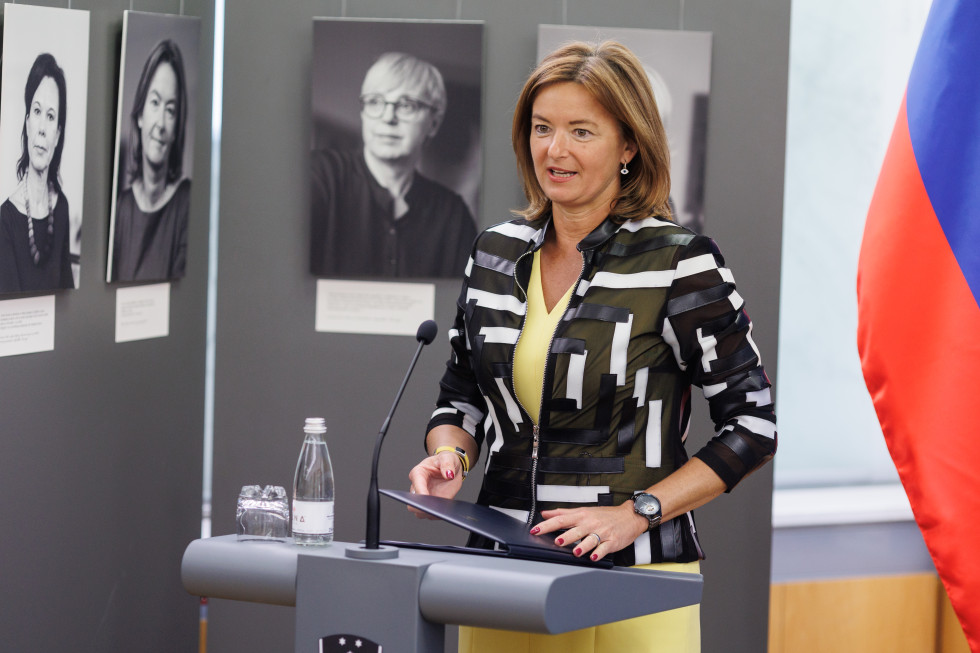Women diplomats highlight the added value of women in diplomacy at a round table

Minister Tanja Fajon opens the exhibition | Author STA/MZEZ
The exhibition shows the unadorned, natural faces of powerful women in politics as they are rarely seen in public. "In the photos we present, we are Slovenian politicians, women ministers, MPs, mayors ... just as we are – without make-up, without masks. Authentic, without imposed beauty ideals. Because what makes us equal to men is our inner strength. And it is our inner strength that will also work internationally for a world of equal opportunities for all," said Minister Fajon, adding that the exhibition premiered on 8 March, but deserved to be revisited for its message and the link between diplomacy and politics and women's equality.
Jernej Jelen, the author of the exhibition, which was being put together from October 2023 to February 2024, said: " With this kind of photos I wanted to show that people shouldn't be bothered by the way women politicians look. What matters is what they do and how they do it. The exhibition is the result of a reflection on the power and role of women in the political world. Through art we not only express our individual stories, but also reflect the society in which we live. Every portrait, every line, wrinkle and dot on a face tells the story of a life – not only the political journey, but also the personal challenges, successes and sacrifices. These stories remind us that authenticity is power and that politics is not just an external gloss, but an internal force for positive change."
As part of the exhibition, a roundtable discussion on women in diplomacy (the International Day of Women in Diplomacy is celebrated on 24 June) was held with Florence Lévy, Ambassador of France to Slovenia, Natalie Kauther, Ambassador of Germany to Slovenia, Eva Tomič, Advisor to the President of the Republic of Slovenia on Climate Policy and Human Rights, and Marta Kos, former Ambassador of Slovenia to Germany and co-founder of the association She Knows. The discussion was moderated by the former Permanent Representative of Slovenia to the United Nations in Geneva, Ambassador Sabina R. Stadler.
The participating diplomats agreed that the role of women in politics, diplomacy and high-level positions in organisations is still small compared to that of men. Ms Tomič pointed out that her beginnings were difficult, having joined the Ministry of Foreign Affairs just as Yugoslavia was breaking up, and that she was lucky that Slovenia became independent and there were not many diplomats. "I know quite a few diplomats who had to make difficult decisions at the expense of their families for the sake of diplomacy, both women and men. But I am happy to see that there are more and more women in diplomacy and that ambassadors are getting younger and younger, which means they have young children. All this shows that we are slowly moving away from the traditional pattern of women having to follow men and give up their careers."
German Ambassador Kauther said she wanted to be both a mother and a diplomat. "Diplomats choose a life where you are in another country for four years and of course the children are with you. And because women have a responsible role in the family, it used to be socially unacceptable for a husband to give up his job. We've changed that now – my husband and I share everything and the kids are used to it, so it doesn't matter who's at home and who's at work, the kids can talk to either one of us.
Stadler, who moderated the panel, explained society's disapproval when she worked instead of staying home with her baby: "I can tell you my story as a diplomat mother. I never had a day of maternity leave, it was my husband who took 100 per cent of the leave. Nobody understood me, not even in this house."
French Ambassador Levy recalled that "we live in a male-dominated society that is brutal. So it's important that things change. Being a diplomat means that we can bring a different perspective to analysing, approaching and confronting problems, that we can listen to different points of view, that we can understand the details. There is also the added value of working with and for a team. And also because women think differently: we are less ideological, more pragmatic and concrete in finding solutions, which comes from our role at home".
But Kos, a former diplomat, sees the urgency of tackling gender inequality: "I can say that certain patterns are very deeply rooted in our society, a well-known psychologist even said that inequality is in our genes. I would say that sometimes it is our fault, but in general it is because of the system that favours men."

